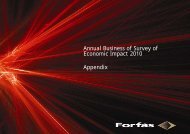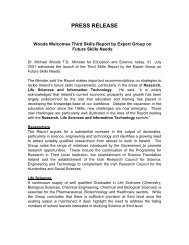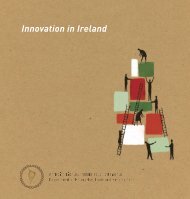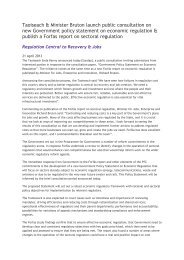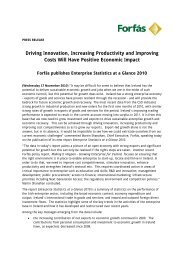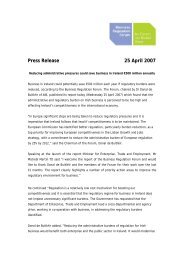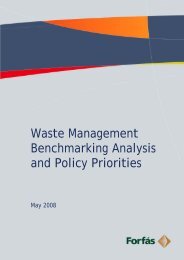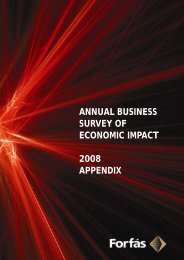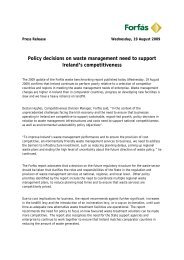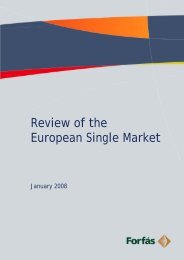Waste Management in Ireland: Benchmarking Analysis and ... - Forfás
Waste Management in Ireland: Benchmarking Analysis and ... - Forfás
Waste Management in Ireland: Benchmarking Analysis and ... - Forfás
Create successful ePaper yourself
Turn your PDF publications into a flip-book with our unique Google optimized e-Paper software.
FORFÁS WASTE MANAGEMENT IN IRELAND: UPDATE 2010<br />
2006. Eurostat data from 2008 divides this recovery figure <strong>in</strong>to material recycl<strong>in</strong>g (32<br />
percent), compost<strong>in</strong>g (3 percent) <strong>and</strong> waste-to-energy (3 percent).<br />
A material recycl<strong>in</strong>g rate of 32 percent <strong>in</strong> 2008 placed <strong>Irel<strong>and</strong></strong> jo<strong>in</strong>t fourth of ten<br />
benchmarked countries/ regions for recycl<strong>in</strong>g performance.<br />
Compost<strong>in</strong>g as a waste treatment option is grow<strong>in</strong>g but rema<strong>in</strong>s at a very low level <strong>in</strong><br />
<strong>Irel<strong>and</strong></strong> (3 percent of municipal waste <strong>in</strong> 2008 was composted).<br />
<strong>Irel<strong>and</strong></strong> rema<strong>in</strong>s the only country of the benchmarked countries/ regions not to have a<br />
commercial waste-to-energy (WtE) market. The 3 percent of municipal Irish waste that<br />
was treated through WtE <strong>in</strong> 2008 was collected, transported <strong>and</strong> treated overseas.<br />
<strong>Waste</strong> <strong>Management</strong> Costs<br />
Although Irish l<strong>and</strong>fill costs have moderated <strong>in</strong> recent years due to the economic<br />
downturn <strong>and</strong> collapse of construction related waste, prices rema<strong>in</strong> high relative to<br />
those <strong>in</strong> other countries. Advertised l<strong>and</strong>fill costs are the highest of the benchmarked<br />
countries/ regions. While lower rates can be negotiated <strong>in</strong> the Irish market, they also<br />
rema<strong>in</strong> relatively high. It is also noted that prices can be negotiated downwards <strong>in</strong><br />
markets <strong>in</strong> other countries/ regions thus erod<strong>in</strong>g some of the competitiveness ga<strong>in</strong>s for<br />
<strong>Irel<strong>and</strong></strong>. Proposed <strong>in</strong>creases <strong>in</strong> the l<strong>and</strong>fill levy will further damage the cost<br />
competitiveness of Irish bus<strong>in</strong>esses.<br />
Levies do not feature <strong>in</strong> the cost of thermal treatment <strong>in</strong> the majority of the<br />
benchmarked countries/ regions. Where levies apply, they are applied either at a very<br />
low level or <strong>in</strong> a way that <strong>in</strong>centivises heat <strong>and</strong> energy recovery. The proposed wasteto-energy<br />
levy st<strong>and</strong>s to <strong>in</strong>hibit the development of waste-to-energy as a waste<br />
management option for Irish enterprise.<br />
Although gate fees for food waste have decreased <strong>in</strong> <strong>Irel<strong>and</strong></strong> over recent years, they<br />
still rema<strong>in</strong> amongst the highest of the benchmarked countries/ regions.<br />
Policy Priorities<br />
A number of waste policy documents are currently be<strong>in</strong>g developed by the Department of<br />
Environment, Heritage <strong>and</strong> Local Government – most notably, the Draft Statement of <strong>Waste</strong><br />
Policy. To avoid impact<strong>in</strong>g on the competitiveness of Irish enterprise, these policy documents<br />
should have adequate cognisance of the follow<strong>in</strong>g enterprise priorities:<br />
Address<strong>in</strong>g current regulatory <strong>and</strong> policy uncerta<strong>in</strong>ty <strong>in</strong> waste management <strong>in</strong><br />
<strong>Irel<strong>and</strong></strong>: Policy uncerta<strong>in</strong>ty is affect<strong>in</strong>g private <strong>in</strong>vestment <strong>in</strong> necessary waste<br />
<strong>in</strong>frastructure. Key aspects to creat<strong>in</strong>g this certa<strong>in</strong>ty will be provid<strong>in</strong>g a level play<strong>in</strong>g<br />
field for private <strong>and</strong> public service <strong>in</strong>frastructure providers <strong>and</strong> address<strong>in</strong>g the<br />
potentially conflict<strong>in</strong>g role of local authorities as service/ <strong>in</strong>frastructure providers <strong>and</strong><br />
as regulators. This should <strong>in</strong>clude the rationalisation of the waste regulatory functions<br />
of local authorities <strong>and</strong> <strong>Forfás</strong> welcomes the consideration that is been given to<br />
rationalisation <strong>in</strong> the Draft Statement of <strong>Waste</strong> Policy.<br />
National coord<strong>in</strong>ation of regional waste plans: With a view to promot<strong>in</strong>g competition,<br />
<strong>in</strong>creas<strong>in</strong>g efficiencies <strong>and</strong> realis<strong>in</strong>g economies of scale, <strong>Forfás</strong> supports greater<br />
coord<strong>in</strong>ation of regional waste plans. In develop<strong>in</strong>g a national management framework,<br />
local authorities should not be precluded from enter<strong>in</strong>g <strong>in</strong>to any contract for treatment<br />
5




